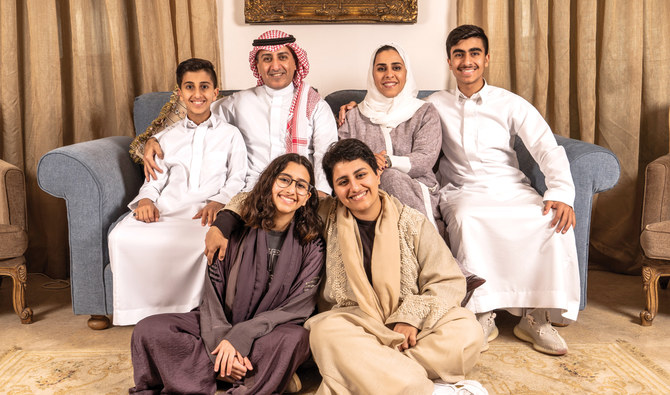I was born and raised in Al-Malaz in Riyadh, where I studied at a public school until the sixth grade, when my family decided to move to Unaizah.
I continued to perform well academically due to my parents’ dedication toward my educational endeavors. My father, may God have mercy upon him, instilled two prominent values in me: Commitment and responsibility. These principles have affected every aspect of my life, especially as the youngest child in a conservative Najdi home.
Surrounded by my older siblings, my childhood was shaped by the multitude of lessons that I learned from them.
My love for children began when I watched my siblings’ kids fill our home with love and energy – a huge part of my adolescence went into taking care of my nieces and nephews.
It made me confident in my ability to deal with children, knowing how to win them over and guide them, which I later put to the test when I finished high school, returning to Riyadh to major in early childhood studies at King Saud University, ultimately graduating with honors.
Following my graduation, I got married and kick-started my professional career as a kindergarten teacher in different private preschools in Riyadh.
Within a few years, I was working as a teacher at Kingdom Schools, dropping my eldest daughter off at the school’s nursery each morning to go and tutor other people’s kids across campus. Over the next seven years, I was blessed with the birth of my three other children.
After years of being simultaneously a mother and a teacher, I decided to put a pause to my career and concentrated on raising my children. This decision was a product of my strong belief in investing in humans through dedicating time and effort toward raising well-mannered individuals and building stronger familial bonds.
Being an educator taught me that there was always space for me to learn something new. I learned a lot from my children, particularly as I remained involved in their school and extracurricular activities, and collaboratively navigated their interests and hobbies.
My prior knowledge of child-nurturing practices helped me form a unique relationship with my kids. The bond between parents and children grows stronger, I found, when parents acknowledge that they are role models and remain aware of their behavior and manners at all times.
Furthermore, it is crucial that parents avoid three harmful, yet common, practices: Criticism, comparison, and blame. These create toxic environments that negatively impact a child’s confidence, sense of self, and self-esteem.
I try to be considerate of my children’s feelings by avoiding harsh or public criticism and focusing on their personal progress, only comparing them with their own selves. If they face a difficult situation, instead of blaming them for it, I encourage them to think about the moral behind the incident and discuss takeaways to be implemented in the future.
I seek to base my relationship with my children on love and understanding by spending a lot of quality time with them and considering their diverse personalities, especially as I returned to the workplace as a school principal and subsequently, an academic supervisor at the Ministry of Education. Those quality times are what remains in a child’s subconscious in the long run.
Later, while pursuing my master’s degree in gifted education at the Arabian Gulf University in Bahrain, I learned about the importance of enriching my children’s interests, whether through helping them explore playing a new instrument, enrolling them in dance courses and soccer academies, presenting them with a book on their to-read list, or accompanying them on outdoor activities.
Sharing these experiences opened new doors for all of us. When my eldest daughter went through the college application process, where she is now pursuing a degree in geology at Brown University, in the US, she opened my eyes to the required preparation for her younger siblings.
By the time they reach her age, they would be prepared with the requirements for applying to esteemed institutions, if they decide to follow a similar path.
Encouraging my older son to follow his passion for the outdoors, through hiking around scenic Saudi nature areas with him, resulted in him climbing Mount Kilimanjaro, in Tanzania, at the age of 14.
Our trips exposed me to the beauty of my country, where I visited fascinating historical and natural sites, had meaningful conversations, and gained valuable friendships.
I was motivated to contribute to the positive changes taking place in the Kingdom by sharing these momentous experiences with others.
That is why I decided to begin the process of acquiring a tourist guide license from the Saudi Commission for Tourism and National Heritage. That in turn gave me a chance to solidify my knowledge of my country and, at the same time, share that beauty with the rest of the world via my podcast, Dharf Makan, and my Instagram account (@mona.alturief).




























